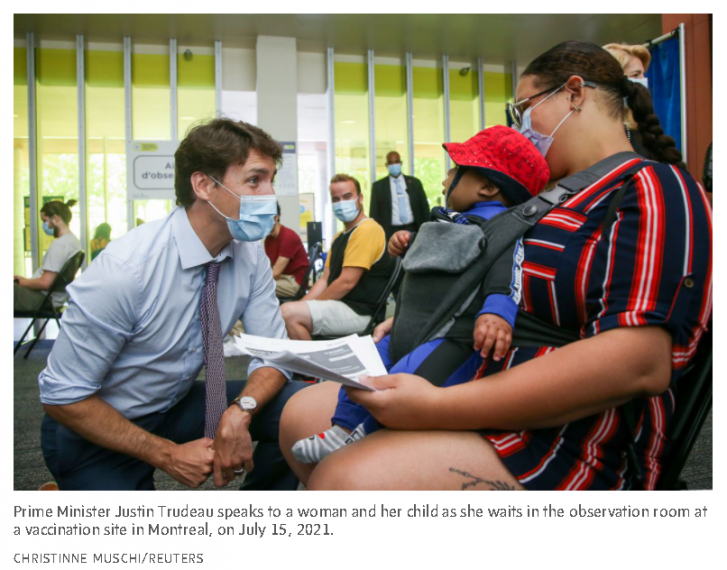Why is Canada going to such great lengths to accommodate the tiny minority of our fellow citizens who refuse to get vaccinated?
Consider this example from Quebec: Nearly 90 per cent of the province’s public-sector health care workers have had their two shots, but fewer than 6,000 employees have chosen to remain unvaccinated. And they’re being rewarded for that choice.
Quebec’s unvaccinated health care workers must take a COVID-19 test three times a week; taxpayers pick up the tab, of course. But if testing isn’t available in their workplace, these workers are given paid time off to travel to and from a testing site. Radio-Canada reports that as a result, some are being paid hundreds of dollars extra each week.
Does this make sense? No. But from coast to coast, Canadian governments are bending over backward to avoid imposing burdens on the unvaccinated. Instead, the unvaccinated are imposing on the rest of us.

It’s true across the political spectrum; from an NDP government in British Columbia that recognizes the safe return to class for universities is dependent on a high vaccination rate, yet which won’t oblige returning students to get inoculated; to Ontario Progressive Conservative Premier Doug Ford, who doesn’t want vaccination requirements for any jobs; to Quebec Health Minister Christian Dubé, who on Friday announced a vaccine lottery in hopes of boosting vaccine uptake – but once again declined to insist that health care workers get vaccinated.
But there’s finally some pushback – from inside health care. Last week, both the Ontario Medical Association and the Registered Nurses’ Association of Ontario came out in favour of mandatory vaccination for front-line workers.
Other employee groups, from coast to coast, should do likewise – in health, child care, elder care, education and higher education. It may be the only thing that can push governments out of their inexplicable, inexcusable passivity.
This isn’t about employees versus employers. In the health sector, for example, the vast majority of people were eager to get their shots. They want to protect themselves and those in their care. They know that allowing workers to go unvaccinated imposes risks on patients, without their consent, for no good reason.
The world is today being hit with a series of variant-powered outbreaks, including in Britain and the Netherlands – countries which are nearly as highly vaccinated as Canada. But the outbreaks are almost entirely among the unvaccinated.
Hospitalizations and deaths in these countries are still far below the pandemic’s dizzying peaks, but the dials are moving in the wrong direction, rapidly. On Thursday, England’s chief medical officer said the number of people in hospital is doubling every three weeks, and threatens to reach “quite scary numbers.” Britain had nearly 40,000 people hospitalized with COVID-19 at the height of the pandemic; if current trends hold, it will again hit that level by early fall.
It’s almost certain that nearly all of those future patients will have had zero shots.
The inescapable conclusion is that, even though 79 per cent of Canadians aged 12 years and over have had a first shot, and more than 56 per cent a second shot, it’s still not enough. This page has long called for Canada to aim for at least 90 per cent coverage. A recent brief in the Canadian Medical Association Journal says that is likely the level needed to achieve herd immunity against the highly contagious Delta variant.
That means public health authorities have to keep reaching out to the unvaccinated; we’ve repeatedly urged copying the door-to-door approach of the census, which has a 98 per cent success rate. Many unvaccinated people are vaccine hesitant, not vaccine hostile. That’s why Canada’s first-shot level is still rising, albeit by less than 1 per cent a week.
Provincial governments should also order that, to work in high-contact sectors like health and education, you must be vaccinated. And students 12 years or older should have to get vaccinated for in-person learning. These are basic, prudent health measures to protect workers, patients, students and society.
Beyond that, does Canada also need domestic proof-of-vaccination passports, which many are calling for – to eat in a restaurant, attend a concert, or even to pick up a jug of milk from the corner store? The answers, later this week.
Article From: Globe and Mail
Author: THE EDITORIAL BOARD

